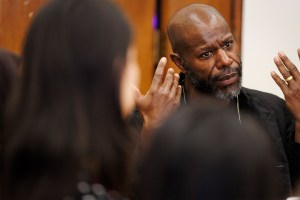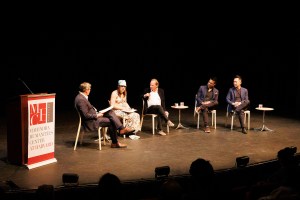Harvard Foundation honors Ruby Dee
Ruby Dee — civil rights activist, star of stage and screen, and the surviving half of a pair who, for much of the 20th century, reigned as the first couple of African-American theater — made it to Harvard this week.
She appeared at Appleton Chapel of the Memorial Church April 17 to receive the 2007 Harvard Foundation Humanitarian Award and deliver the annual Peter J. Gomes Humanitarian Lecture.
“I’ve been hoping all my life to be associated with Miss Ruby Dee,” said Peter J. Gomes, Plummer Professor of Christian Morals and Pusey Minister in the Memorial Church, in introducing her. “I’ve risen beyond my station.”
Among the insights she shared in her brief remarks at Tuesday’s event was a remarkable confession: She and her late husband, the actor Ossie Davis, “never liked the song ‘We Shall Overcome.’”
After all, she explained, the song says, “We shall overcome some day.”
“We never liked it. ‘Some day’ is trickle-down. ‘Some day’ is ‘never.’ There’s no such day of the week as ‘Someday.’ The word is ‘today.’
“And today is ours.”
She explained to her audience how she and her husband and those they admired and worked with — the actor Paul Robeson, the contralto Marian Anderson — saw the arts as an arena for advancing the cause of civil rights. And work in the arts offered opportunity to give the lie to the racial stereotypes all around them, and the bigoted notions of what black people could or could not do.
“We could not conceive or entertain the idea of art for art’s sake,” she said. “When we heard Marian Anderson sing a song, we knew there was struggle and pain and death and resurrection involved in the singing, and when we listened to it, we knew that she was speaking from the depths of her experience. … She was singing to and for her people.
“It was impossible to think of Marian Anderson singing for the sake of singing.”
Joe Louis was another of Dee’s heroes: “Every time he stepped into the ring, every blow he landed was a blow for freedom,” she said.
“Ruby Dee is an enduring symbol of artistic excellence in American theater and film,” S. Allen Counter, director of the Harvard Foundation, told the audience in Appleton Chapel. “For over a half-century, she has given masterful stage and screen performances that have awed and inspired Americans of all backgrounds.”
Dee was born in Cleveland and grew up in Harlem. She began her career as a member of the American Negro Theatre. She received her B.A. from Hunter College, and later studied acting with Paul Mann, Lloyd Richards, and Morris Carnovsky. She is well-known for her role as Ruth in both the stage and screen versions of “A Raisin in the Sun” and her starring roles in the films “The Jackie Robinson Story,” “Do the Right Thing,” and “Decoration Day,” for which she received an Emmy award in 1991.
Her most recent cinematic roles have been in “American Gangster,” with Denzel Washington and Russell Crowe; in “Steamroom,” with Dick Anthony Williams and Ally Sheedy; and in the independent film “Clarksdale.”
In 2006, Dee released the selected speeches and writings of Ossie Davis in “Life Lit by Some Large Vision.” She is also the author of a book of poetry and short stories, “My One Good Nerve” (which she has adapted into a solo performance piece). She recently earned a Grammy award in the Spoken Word category for the audio version of her book “With Ossie and Ruby: In This Life Together,” a joint autobiography written with her husband.
In 1988, Dee was inducted into the Theatre Hall of Fame. She is also in the NAACP Image Award Hall of Fame. Her honors also include the Silver Circle Award by the Academy of Television Arts and Science, the National Medal of Arts Award, and the Screen Actors Guild’s Lifetime Achievement Award. In December 2004, Dee and Davis were recipients of the John F. Kennedy Center Honors.
“It is such an honor to receive this distinguished award,” Dee said in Appleton Chapel. She acknowledged several previous recipients of the annual Humanitarian Award, including Elie Wiesel; Archbishop Desmond M. Tutu; David Ho, the AIDS researcher; “and my very good friend James Earl Jones,” the actor.
“We have waited too long to greet you at Harvard,” Gomes responded.




